Introduction:
Integrating the Principles of Conceptual Thinking into the Process of Personal Development

Imagine for a moment, you're standing at the edge of a cliff, staring out at the vast horizon before you. You can see the endless possibilities stretching out before you, but you can't help feeling a sense of uncertainty and confusion. You know that you want to reach the other side, but you don't know how to get there. This is the feeling of being stuck in life, unable to see the bigger picture and unable to take action towards your goals.

But what if I told you that there's a way to break through this feeling of stagnation and reach new heights? What if I told you that by understanding the principles of conceptual thinking, you can unlock the power to transform your life?
Welcome to the world of conceptual thinking and personal development. In this blog, we'll dive deep into the principles of conceptual thinking and how they can be integrated into the process of personal development. We'll explore the properties, roles, and characteristics of conceptual thinking and how they impact personal growth. We'll also discuss the benefits, challenges, and limitations of conceptual thinking in personal development.

Understanding the concept of thinking conceptually is crucial for personal development. It's the difference between merely existing and truly living. It's the difference between being a spectator and being a player in the game of life.
So, come along with me on this journey and discover how conceptual thinking can be a key to unlocking your true potential and achieving your life goals.
The Significance of Conceptual Thinking in Relation to Personal Development
What is conceptual thinking and how is it related to personal development?
Conceptual thinking is the ability to see the big picture and understand the relationships between different ideas and concepts. It's a way of thinking that allows us to see connections and patterns that might not be immediately obvious when we're thinking literally or linearly. It's a way of thinking that requires more abstract and creative thinking skills, but it's also more rewarding as it allows us to come up with more innovative and creative solutions to problems.
The Principles of Conceptual Thinking

What are the principles of conceptual thinking and how can they be applied in personal development?
The principles of conceptual thinking include looking at the bigger picture, understanding the relationships between different ideas and concepts, and thinking critically and creatively. These principles are essential for personal development as they allow us to see the world in a more expansive and creative way. They help us to think beyond the surface level of things and to see the bigger picture and the connections between different concepts and ideas.
The Properties of Conceptual Thinking and their Impact on Personal Growth
What are the properties, roles, characteristics, and processes of conceptual thinking and how do they impact personal growth?
The properties of conceptual thinking include its ability to generate new ideas and solutions, its ability to think critically and creatively, and its ability to better understand and navigate the world around us. These properties are significant in relation to personal development as they allow us to approach problems and challenges in a more creative and holistic way. They also contribute to personal growth by helping us to expand our understanding and problem-solving skills.
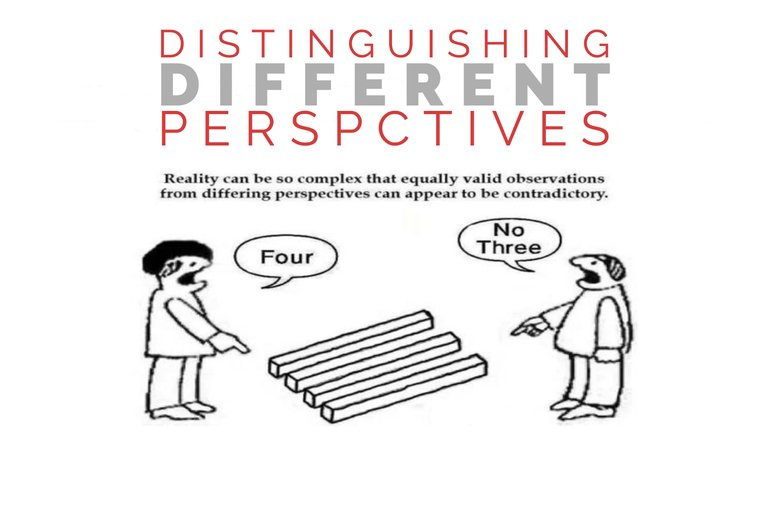
The Roles, Characteristics, and Traits of Conceptual Thinking in Personal Development
The roles, characteristics, and traits of conceptual thinking include its ability to see the big picture, its ability to think critically and creatively, and its ability to understand the interconnectedness of ideas. These roles, characteristics, and traits contribute to the significance of conceptual thinking in personal development by allowing us to approach problems and challenges in a more creative and holistic way. They also contribute to personal growth by helping us to expand our understanding and problem-solving skills.
The Processes Involved in Conceptual Thinking and Their Significance
The various processes involved in conceptual thinking include asking "why" or "how" questions, brainstorming, and using graphic organizers. These processes are significant in relation to personal development as they allow us to develop our conceptual thinking skills and approach problems and challenges in a more creative and holistic way.
The Benefits of Utilizing Conceptual Thinking in Personal Development
What are the benefits of understanding and utilizing conceptual thinking in personal development?
The benefits of understanding and utilizing conceptual thinking in personal development include the ability to generate new ideas and solutions, think critically and creatively, and better understand and navigate the world around us. These benefits can be applied in personal development by using conceptual thinking to approach problems and challenges in a more creative and holistic way.
Applying Conceptual Thinking in Personal Development: Real-world Examples
How can conceptual thinking be applied in real-world situations and examples?
Examples of how conceptual thinking can be applied in personal development include using it to solve complex social issues and to create a personal development plan. Examples of how the principles of conceptual thinking can be integrated into the process of personal development include using them to create a vision board and to set clear and specific goals.
Challenges and Limitations of Conceptual Thinking in Personal Development
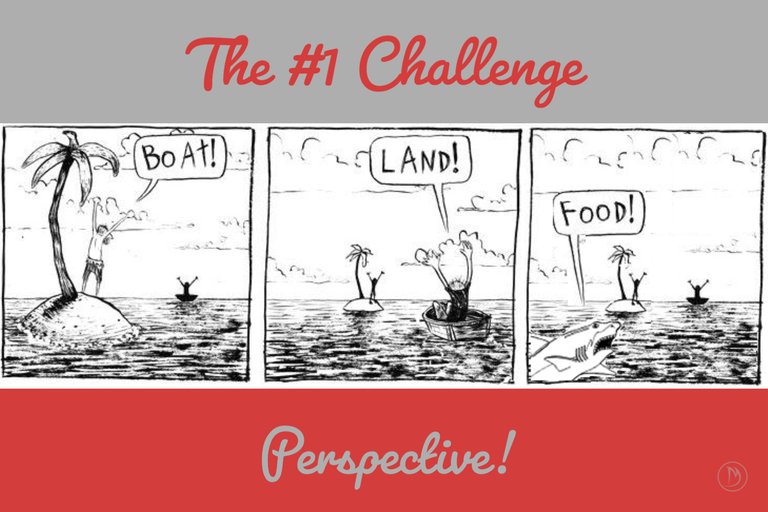
What are the challenges and limitations of using conceptual thinking in personal development?
Challenges and limitations associated with conceptual thinking in personal development include the fact that it can be more challenging than thinking literally and that it requires more abstract and creative thinking skills. To overcome these challenges and limitations, it's important to use strategies such as asking "why" or "how" questions, brainstorming, and using graphic organizers. Additionally, it's important to practice and continually work on developing your conceptual thinking skills.
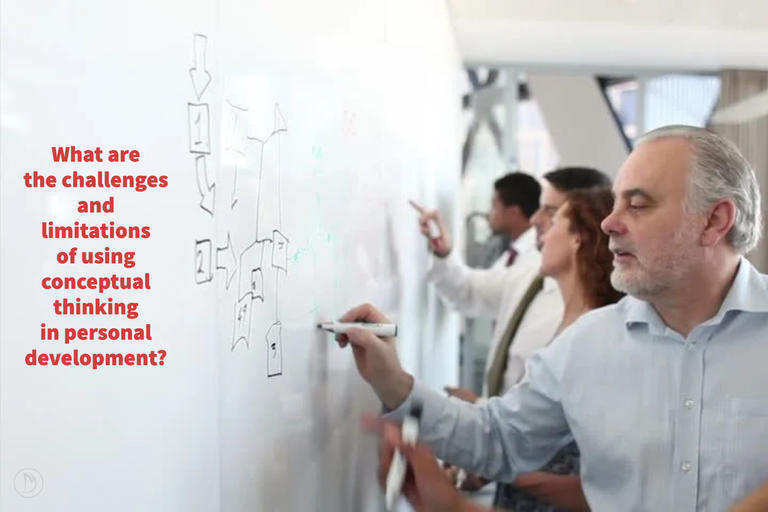
Tips and Strategies for Effectively Utilizing Conceptual Thinking in Personal Development
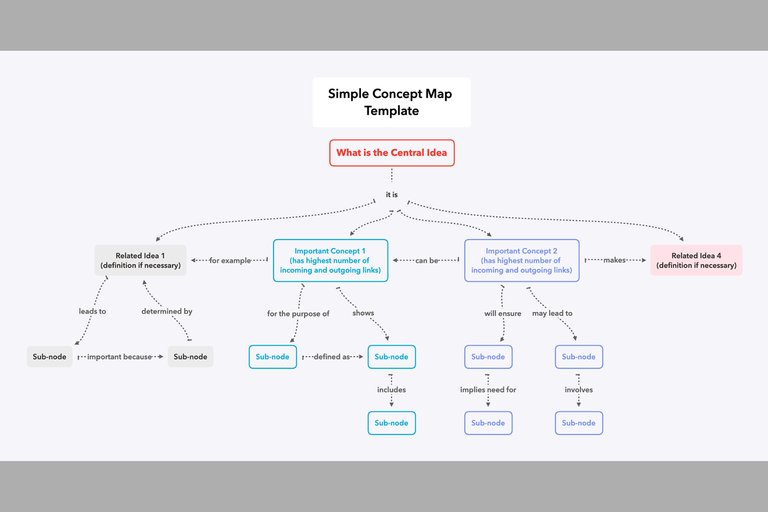
What tips and strategies can be used to effectively integrate conceptual thinking into personal development?
Tips and strategies for effectively utilizing conceptual thinking in personal development include setting aside dedicated time to practice and develop your conceptual thinking skills, surrounding yourself with people who encourage and support your growth, and using visualization techniques to help you see the bigger picture.
Mastering the Art of Concept Mapping
A Step-by-Step Guide to Organizing and Visualizing Your Ideas
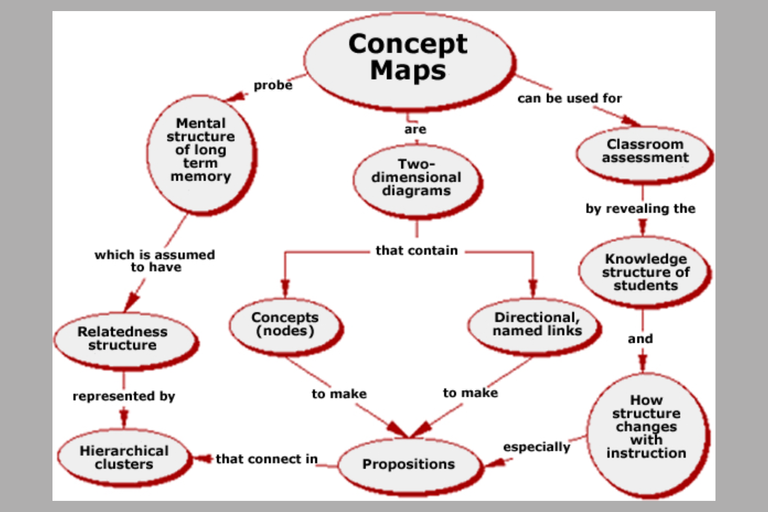
How can a person create a visual representation of their goals, aspirations, and vision for their life using the principles of conceptual thinking?
Start by identifying the main topic or concept you want to map.
Break down the main topic into smaller, more specific subtopics or subconcepts.
Organize the subtopics or subconcepts in a logical and meaningful way, such as chronologically, hierarchically, or by category.
Use lines or arrows to connect the subtopics or subconcepts to the main topic or to each other, indicating relationships and connections.
Add details and information to the subtopics or subconcepts, such as examples, definitions, or explanations.
Review the concept map to ensure that it is clear and coherent, and make any necessary adjustments or revisions.
Add visual elements such as images or colors to enhance the concept map's overall appearance and readability.
Repeat the process as needed, making sure to add new information as you learn it.
Reflect on the concept map and how it might be applied in real-world situations.
Share the concept map with others for feedback and further learning.
Conclusion:
Transforming Your Life with Conceptual Thinking.
Let me tell you, understanding the concept of thinking conceptually is crucial for personal development. It's the difference between just existing and truly living. The principles, properties, roles, characteristics, and processes of conceptual thinking are what separates the spectators from the players in the game of life.
But it's not just about understanding, it's about applying and taking action. The true value of conceptual thinking lies in its ability to transform your life. By utilizing the tips and strategies provided, you can effectively integrate conceptual thinking into your personal development journey and unlock your true potential.
The implications and applications of conceptual thinking are limitless. It can be applied to any aspect of your life, from setting and achieving your goals, to navigating complex challenges and situations. It can help you to think more critically and creatively and to see the world in a more expansive and holistic way.
So, I challenge you, don't just read this blog and nod your head in agreement. Take action. Take what you've learned and apply it to your own lifescape. Create your own blueprint, map out your goals and aspirations, and take the first step towards the life you truly want to live. Remember, the only limit is the one you set for yourself. Keep pushing, keep growing, and never stop reaching for greatness.

I want to express my gratitude to each and every one of you for taking the time to read this blog and for deciding to take action today in your self-improvement journey. Your support is invaluable, and I am truly humbled by your presence and engagement.
As you may know, I am on a mission to empower individuals to achieve their full potential through personal growth and development. I am in the process of writing a guidebook, and I am also starting a movement called Lifescape. Together, we can make a difference in the lives of many.
But, I cannot do it alone. I need your support, your ideas, and your feedback. If you would like to see more content like this, please leave your comments, give me an upvote, and follow me to stay tuned in for more. And, if you have any ideas or suggestions for what you would like me to talk about next, please let me know. Who knows, I might make my next piece of content just for you.
And, if you feel inclined to support my efforts financially, I do accept donations. Your contributions and gifts help me to provide free giveaways, contests, and airdrops. You can support me on HIVE, PublishOx, Minds, WordPress, or other social media platforms.
I am also looking to expand my reach and create new communities on Hive and other platforms. If you'd like to help me bring new life to these communities here and abroad, you can support my blogs with tips and using my referral links, by providing donations or offering great ideas. Together, we can pay it forward and make a difference.
You can also find me and more content like this on my Linktree: https://linktr.ee/the.official.dm. Thank you again for your support and I look forward to continuing to empower and inspire you on your personal growth and development journey.
Further Resources:
Some recommended resources for further reading on the topic of conceptual thinking and its application in personal development include:
- "Thinking, Fast and Slow" by Daniel Kahneman - This bestselling book delves into the psychology of thinking and decision-making and explores how our minds process information and make judgments. It provides insight into how conceptual thinking can be used to overcome cognitive biases and make better decisions.
- "Conceptual Blockbusting: A Guide to Better Ideas" by James L. Adams - This classic book on creativity and problem-solving teaches readers how to overcome mental blocks and think more conceptually in order to generate new and innovative ideas.
- "Mindset: The New Psychology of Success" by Carol Dweck - This bestselling book explores the concept of a growth mindset and how it can be used to achieve personal and professional success. It highlights the importance of conceptual thinking in developing a positive attitude towards learning and growth.
- "The Power of Strategic Thinking: Essential Skills for Leaders" by Joel A. Barker - This book provides practical guidance on how to use conceptual thinking to create effective strategies and achieve long-term success in business and personal development.
- "The Art of Possibility: Transforming Professional and Personal Life" by Rosamund Stone Zander and Benjamin Zander - This book explores the concept of possibility thinking and how it can be used to create new opportunities and achieve personal and professional goals. It highlights the importance of conceptual thinking in fostering creativity and innovation.
- "Flow: The Psychology of Optimal Experience" by Mihaly Csikszentmihalyi - This classic book explores the concept of flow, a state of heightened focus and engagement, and how it can be used to enhance personal development and achieve optimal performance.
- "The Big Picture: On the Origins of Life, Meaning, and the Universe Itself" by Sean Carroll - This book takes a scientific and philosophical approach to understanding the big picture of the universe, the meaning of life and the role of consciousness. It provides a unique perspective on conceptual thinking.
This post was shared on Reddit by ( @the-official-dm ). Register with @poshtoken, sign up at https://hiveposh.com.https://reddit.com/r/personalgrowthchannel/comments/10kjhcn/from_stuck_to_success_how_conceptual_thinking_can/
Congratulations @the-official-dm! You have completed the following achievement on the Hive blockchain And have been rewarded with New badge(s)
Your next target is to reach 50 replies.
You can view your badges on your board and compare yourself to others in the Ranking
If you no longer want to receive notifications, reply to this comment with the word
STOPCheck out our last posts:
Support the HiveBuzz project. Vote for our proposal!